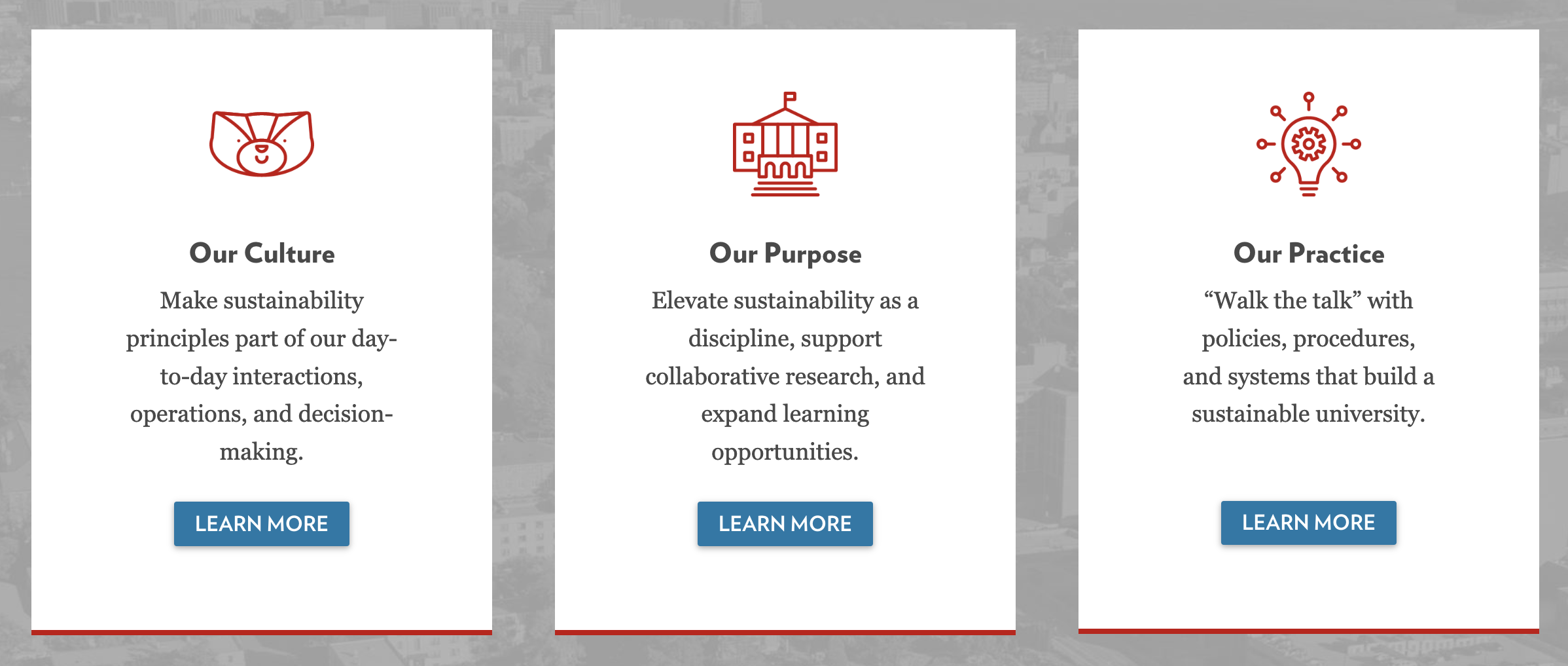Human Resources is the backbone of UW–Madison, furnishing the entire university community with professional support and development—and knitting together the arc of every employee’s career on campus. In these capacities, the field of human resources approaches the university as an interconnected systems of people, activities, and practices.
So, too, does sustainability, which offers a systemic approach to interconnected issues—environment, economy, and society—that applies to nearly every aspect of the higher education context. Despite an impressive legacy of prominent environmental figures and a highly productive research enterprise, however, the University of Wisconsin–Madison lags behind many of its peers in sustainability performance. UW–Madison did not perform an institutional sustainability assessment until 2019, when it scored a Silver rating—a respectable start for a large institution, but with plenty of room for improvement.
Encouragingly, Chancellor Blank has supported the growth of the Office of Sustainability (OS) over the last several years, and in turn, the OS has been collaborating with experts and partners across campus to build a new framework for sustainability leadership at UW–Madison. That framework offers a holistic approach to sustainability that incorporates three key concepts: culture, purpose, and practice.
Gathering sustainability stakeholders
In October of 2020, the Sustainability Advisory Council (SAC) began the work of identifying strategic failures and achievement gaps that have limited our institution’s advancement in this critical field. The SAC, which is sponsored by the Provost and the Vice Chancellor for Finance and Administration, is composed of staff, faculty, shared governance, and students from across campus, and also supports a student-only subcommittee.
By following a careful and iterative process over the subsequent eight months, the SAC issued initial recommendations that illuminate a pathway for sustainability leadership. In forging that pathway, the SAC also developed a new definition of sustainability that builds on global frameworks–like The Bruntland Commission, Earth Charter, and the United Nations Sustainable Development Goals—while aligning with the specific context of UW–Madison:
Sustainability at UW–Madison unites equity, efficiency, education,
and research in service of environmental health for all.
It is important to note that Indigenous knowledge is equally important to scholarly and/or scientific methodologies in addressing sustainability challenges. Advancing sustainability at UW-Madison will be actively informed by this knowledge through collaboration with Native Nations_UW, the Wisconsin Tribal Conservation Advisory Council, and other communities as appropriate.
From talk to action
The SAC’s recommendations for how to achieve sustainability leadership are based on a set of three concepts: our culture (or collective behavioral and procedural norms), our purpose (research and education), and our practice (how we operate campus). Only by making complementary advancements in each of these areas will UW–Madison advance as a leader in the sustainability community.

In the coming months, the SAC will be forming a series of action groups to vet and launch initiatives in support of the new sustainability framework. This institutional, top-down approach is critical—indeed, it comprises a large part of what UW–Madison has been missing. But sustainability also requires bottom-up efforts, and there are a number of opportunities across each of these three areas for students, staff, and faculty to join the effort to transform UW–Madison into a truly sustainable institution.
Our Culture: Make sustainability principles part of our day-to-day interactions, operations, and decision-making
- Find sustainability events
- Subscribe to the UW Sustainability Newsletter
- Follow us on social media
- Facebook: @SustainUW
- Twitter: @SustainUW
- Instagram: @sustainUW
- LinkedIn: UW-Madison Office of Sustainability
- YouTube: UW-Madison Office of Sustainability
- Listen to the SustainUW Podcast
- Join the Sustainability Community of Practice
Our Purpose: Elevate sustainability as a discipline, support collaborative research, and expand learning opportunities
- Collaborate with us
- Join the Sustainability Experts Database
- Learn about the Green Fund
- Apply for the Course Attribute for Sustainability
- Attend a monthly coffee chat (last Friday of every month; follow our social media for announcements)
Our Practice: “Walk the talk” with policies, procedures, and systems that build a sustainable university
- Participate in our green certification programs:
- Follow along as the university fulfills the Resilience Commitment
- Learn about our renewable energy projects
- Contribute to our Zero Waste goals
- Make use of sustainable transportation options
It’s become a common saying, but it truly is up to all of us to create a sustainable future. We hope you’ll join your UW–Madison colleagues in this collective mission.
For more information, contact:
Alex Frank, Senior Analyst, Office of Sustainability
Nathan Jandl, Assistant Director, Office of Sustainability